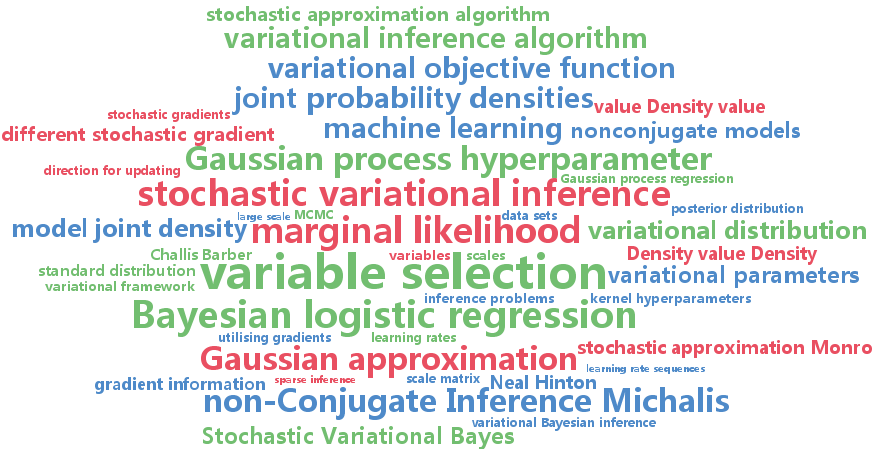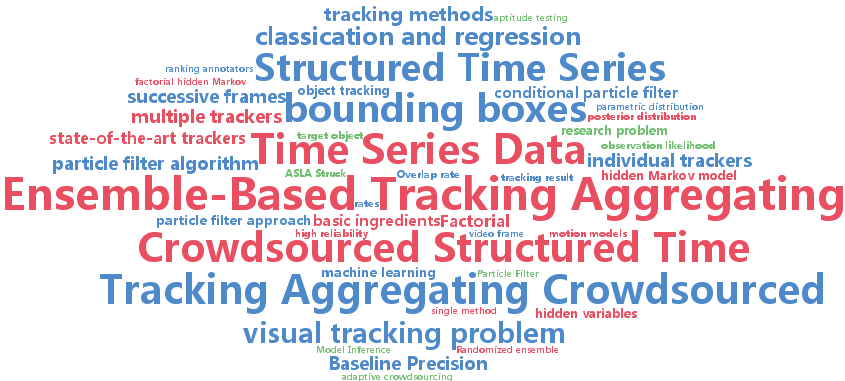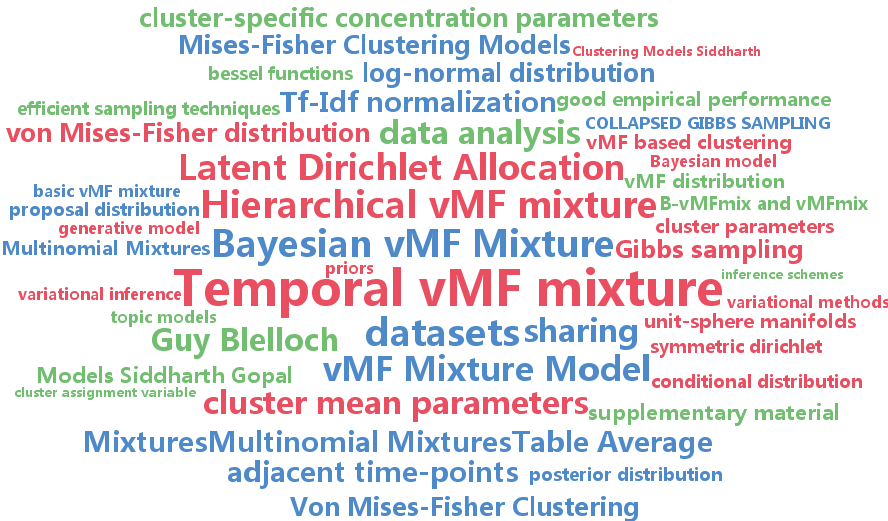posterior distribution
-
Shike Mei and Jun Zhu and Jerry Zhu
Robust RegBayes: Selectively Incorporating First-Order Logic Domain Knowledge into Bayesian Models (pdf)
Much research in Bayesian modeling has been done to elicit a prior distribution that incorporates domain knowledge. We present a novel and more direct approach by imposing First-Order Logic (FOL) rules on the posterior distribution. Our approach unifies FOL and Bayesian modeling under the regularized Bayesian framework. In addition, our approach automatically estimates the uncertainty of FOL rules when they are produced by humans, so that reliable rules are incorporated while unreliable ones are ignored. We apply our approach to latent topic modeling tasks and demonstrate that by combining FOL knowledge and Bayesian modeling, we both improve the task performance and discover more structured latent representations in unsupervised and supervised learning.
-
Aonan Zhang and Jun Zhu and Bo Zhang
Max-Margin Infinite Hidden Markov Models (pdf)
Infinite hidden Markov models (iHMMs) are nonparametric Bayesian extensions of hidden Markov models (HMMs) with an infinite number of states. Though flexible in describing sequential data, the generative formulation of iHMMs could limit their discriminative ability in sequential prediction tasks. Our paper introduces max-margin infinite HMMs (M2iHMMs), new infinite HMMs that explore the max-margin principle for discriminative learning. By using the theory of Gibbs classifiers and data augmentation, we develop efficient beam sampling algorithms without making restricting mean-field assumptions or truncated approximation. For single variate classification, M2iHMMs reduce to a new formulation of DP mixtures of max-margin machines. Empirical results on synthetic and real data sets show that our methods obtain superior performance than other competitors in both single variate classification and sequential prediction tasks.
-
Sungjin Ahn and Babak Shahbaba and Max Welling
Distributed Stochastic Gradient MCMC (pdf)
Probabilistic inference on a big data scale is becoming increasingly relevant to both the machine learning and statistics communities. Here we introduce the first fully distributed MCMC algorithm based on stochastic gradients. We argue that stochastic gradient MCMC algorithms are particularly suited for distributed inference because individual chains can draw minibatches from their local pool of data for a flexible amount of time before jumping to or syncing with other chains. This greatly reduces communication overhead and allows adaptive load balancing. Our experiments for LDA on Wikipedia and Pubmed show that relative to the state of the art in distributed MCMC we reduce compute time from 27 hours to half an hour in order to reach the same perplexity level.
-
Christopher Tosh and Sanjoy Dasgupta
Lower Bounds for the Gibbs Sampler over Mixtures of Gaussians (pdf)
The mixing time of a Markov chain is the minimum time $t$ necessary for the total variation distance between the distribution of the Markov chain's current state $X_t$ and its stationary distribution to fall below some $\epsilon > 0$. In this paper, we present lower bounds for the mixing time of the Gibbs sampler over Gaussian mixture models with Dirichlet priors.
-
Michalis Titsias and Miguel Lázaro-Gredilla
Doubly Stochastic Variational Bayes for non-Conjugate Inference (pdf)
We propose a simple and effective variational inference algorithm based on stochastic optimisation that can be widely applied for Bayesian non-conjugate inference in continuous parameter spaces. This algorithm is based on stochastic approximation and allows for efficient use of gradient information from the model joint density. We demonstrate these properties using illustrative examples as well as in challenging and diverse Bayesian inference problems such as variable selection in logistic regression and fully Bayesian inference over kernel hyperparameters in Gaussian process regression.
-
Naiyan Wang and Dit-Yan Yeung
Ensemble-Based Tracking: Aggregating Crowdsourced Structured Time Series Data (pdf)
We study the problem of aggregating the contributions of multiple contributors in a crowdsourcing setting. The data involved is in a form not typically considered in most crowdsourcing tasks, in that the data is structured and has a temporal dimension. In particular, we study the visual tracking problem in which the unknown data to be estimated is in the form of a sequence of bounding boxes representing the trajectory of the target object being tracked. We propose a factorial hidden Markov model (FHMM) for ensemble-based tracking by learning jointly the unknown trajectory of the target and the reliability of each tracker in the ensemble. For efficient online inference of the FHMM, we devise a conditional particle filter algorithm by exploiting the structure of the joint posterior distribution of the hidden variables. Using the largest open benchmark for visual tracking, we empirically compare two ensemble methods constructed from five state-of-the-art trackers with the individual trackers. The promising experimental results provide empirical evidence for our ensemble approach to "get the best of all worlds".
-
Siddharth Gopal and Yiming Yang
Von Mises-Fisher Clustering Models (pdf)
This paper proposes a suite of models for clustering high-dimensional data on a unit sphere based on Von Mises-Fisher (vMF) distribution and for discovering more intuitive clusters than existing approaches. The proposed models include a) A Bayesian formulation of vMF mixture that enables information sharing among clusters, b) a Hierarchical vMF mixture that provides multi-scale shrinkage and tree structured view of the data and c) a Temporal vMF mixture that captures evolution of clusters in temporal data. For posterior inference, we develop fast variational methods as well as collapsed Gibbs sampling techniques for all three models. Our experiments on six datasets provide strong empirical support in favour of vMF based clustering models over other popular tools such as K-means, Multinomial Mixtures and Latent Dirichlet Allocation.
-
Brooks Paige and Frank Wood
A Compilation Target for Probabilistic Programming Languages (pdf)
Forward inference techniques such as sequential Monte Carlo and particle Markov chain Monte Carlo for probabilistic programming can be implemented in any programming language by creative use of standardized operating system functionality including processes, forking, mutexes, and shared memory. Exploiting this we have defined, developed, and tested a probabilistic programming language intermediate representation language we call probabilistic C, which itself can be compiled to machine code by standard compilers and linked to operating system libraries yielding an efficient, scalable, portable probabilistic programming compilation target. This opens up a new hardware and systems research path for optimizing probabilistic programming systems.







